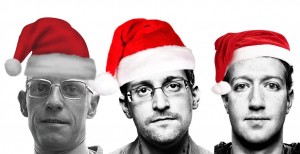Panopti-Claus

(See below for answer.)
Charles Kurzman, “Panopti-Claus,” December 19, 2014.
They’re making a list, checking it twice. Gonna find out who’s naughty or nice.
Included in this list is every website you visited, every note you wrote or received, every purchase and phone call. The list contains every election you voted in, every location you visited, and when.
The lists used to be separate. Until recently, only Santa Claus and God had access to the complete file, and Santa limited himself mainly to children. When your permanent record was on paper, government agencies and commercial info-mongers had difficulty combining their lists. Liberty lay in the inefficiencies of data-merges.
Now the lists are easily agglomerated, and legal barriers to data access have been removed or sidestepped. Your credit card and grocery card and SIM card and IP address and Social Security number are all cross-referenced and available for purchase or subpoena.
As movies and friend requests stream in, a report of your activity streams out. With all this information, they see you when you’re sleeping. (Creepy.) They know when you’re awake. They know each time you pause your show to take a bathroom break.
And it is all for goodness’s sake. Knowing when you flush allows sewage operator to build the necessary capacity and catch violators of drought restrictions. Knowing your precise location helps emergency crews respond quickly if you need assistance. Knowing your online friends lets social media companies route their posts to your account.
So you better watch out, you better not cry. Delinquency will be noted by the all-seeing eye.
This vision animated philosopher Jeremy Bentham, whose design for an all-seeing “Panopticon,” published in 1791, was based on what he called “the inspection principle”: “the more constantly the persons to be inspected are under the eyes of the persons who should inspect them, the more perfectly will the purpose of the establishment have been attained.” If constant inspection is not feasible, Bentham wrote, “the next thing to be wished for” is a system that makes people feel as though they were under constant inspection. The result, Bentham proposed, would be: “Morals reformed – health preserved – industry invigorated, instruction diffused – public burthens lightened.”
In the centuries since Bentham’s vision, the Panopticon and other technologies of surveillance — censuses, school systems, medical examinations, and record-keeping in general — have become widespread. According to philosopher Michel Foucault, these systems were presented in terms of well-meaning goals of human improvement, but their cumulative effect was a sinister “swarming of disciplinary mechanisms.” George Orwell famously described this nightmarish image in the novel “1984,” published in 1949:
“There was of course no way of knowing whether you were being watched at any given moment. How often, or on what system, the Thought Police plugged in on any individual wire was guesswork. It was even conceivable that they watched everybody all the time. But at any rate they could plug in your wire whenever they wanted to. You have to live – did live, from habit that became instinct – in the assumption that every sound you made was overheard, and, except in darkness, every movement scrutinized.”
God and Santa, unlike Orwell’s Thought Police, are able see in darkness. “The great guardian among these (gods) sees as if from anear; he that thinketh he is moving stealthily, all this the gods know,” one scripture says. “Nothing in all creation is hidden from God’s sight,” says another. “Do whatever you will, He sees what you do,” says another.
Facebook and Google and Apple and the NSA and the GCHQ and the rest can see in darkness, too. Their servers hum all night, while visions of sugar plums dance in our heads.
[Answer to image-quiz: The real Panopti-Claus (or at least one of them) is on the right: Mark Zuckerberg of Facebook. On the left is Michel Foucault, who theorized the panoptic society a generation ago. In the middle is Edward Snowden, whose leak of National Security Agency files in 2013 revealed the expansiveness of government panopticism in the U.S. and among its allies.]